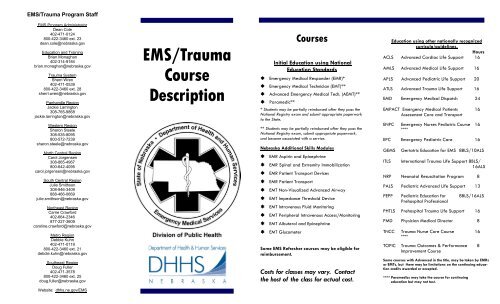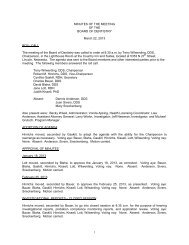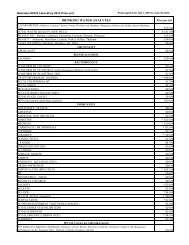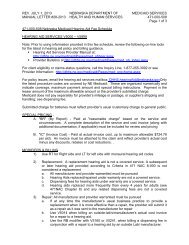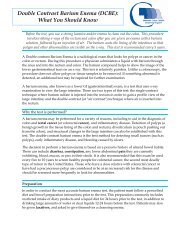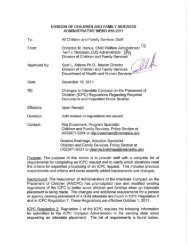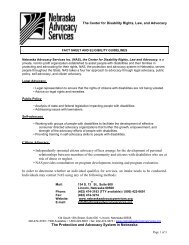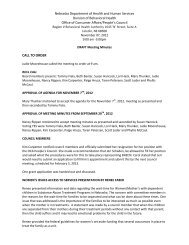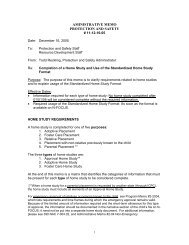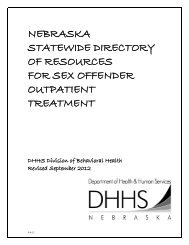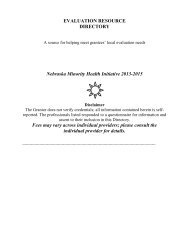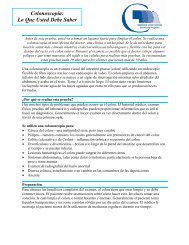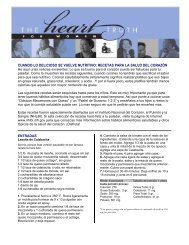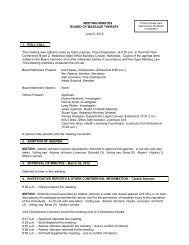EMS/Trauma Course Description - Nebraska Health and Human ...
EMS/Trauma Course Description - Nebraska Health and Human ...
EMS/Trauma Course Description - Nebraska Health and Human ...
You also want an ePaper? Increase the reach of your titles
YUMPU automatically turns print PDFs into web optimized ePapers that Google loves.
<strong>EMS</strong>/<strong>Trauma</strong> Program Staff<br />
<strong>EMS</strong> Program Administrator<br />
Dean Cole<br />
402-471-0124<br />
800-422-3460 ext. 23<br />
dean.cole@nebraska.gov<br />
Education <strong>and</strong> Training<br />
Brian Monaghan<br />
402-314-9184<br />
brian.monaghan@nebraska.gov<br />
<strong>Trauma</strong> System<br />
Sherri Wren<br />
402-471-0539<br />
800-422-3460 ext. 28<br />
sherri.wren@nebraska.gov<br />
Panh<strong>and</strong>le Region<br />
Jackie Larrington<br />
308-765-9868<br />
jackie.larrington@nebraska.gov<br />
Western Region<br />
Sharon Steele<br />
308-535-8095<br />
800-572-7239<br />
sharon.steele@nebraska.gov<br />
North Central Region<br />
Carol Jorgensen<br />
308-865-4967<br />
800-642-4095<br />
carol.jorgensen@nebraska.gov<br />
South Central Region<br />
Julie Smithson<br />
308-946-3409<br />
888-466-0669<br />
julie.smithson@nebraska.gov<br />
Northeast Region<br />
Carrie Crawford<br />
402-664-2346<br />
877-227-3609<br />
caroline.crawford@nebraska.gov<br />
Metro Region<br />
Debbie Kuhn<br />
402-471-0119<br />
800-422-3460 ext. 21<br />
debdie.kuhn@nebraska.gov<br />
Southeast Region<br />
Doug Fuller<br />
402-471-3578<br />
800-422-3460 ext. 25<br />
doug.fuller@nebraska.gov<br />
<strong>EMS</strong>/<strong>Trauma</strong><br />
<strong>Course</strong><br />
<strong>Description</strong><br />
Initial Education using National<br />
Education St<strong>and</strong>ards<br />
Emergency Medical Responder (EMR)*<br />
Emergency Medical Technician (EMT)**<br />
Advanced Emergency Medical Tech. (AEMT)**<br />
Paramedic**<br />
* Students may be partially reimbursed after they pass the<br />
National Registry exam <strong>and</strong> submit appropriate paperwork<br />
to the State.<br />
** Students may be partially reimbursed after they pass the<br />
National Registry exam, submit appropriate paperwork,<br />
<strong>and</strong> become associated with a service.<br />
<strong>Nebraska</strong> Additional Skills Modules<br />
EMR Aspirin <strong>and</strong> Epinephrine<br />
EMR Spinal <strong>and</strong> Extremity Immobilization<br />
EMR Patient Transport Devices<br />
EMR Patient Transport<br />
EMT Non-Visualized Advanced Airway<br />
EMT Impedance Threshold Device<br />
EMT Intravenous Fluid Monitoring<br />
EMT Peripheral Intravenous Access/Monitoring<br />
EMT Albuterol <strong>and</strong> Epinephrine<br />
EMT Glucometer<br />
<strong>Course</strong>s<br />
Some <strong>EMS</strong> Refresher courses may be eligible for<br />
reimbursement.<br />
Costs for classes may vary. Contact<br />
the host of the class for actual cost.<br />
Education using other nationally recognized<br />
curricula/guidelines.<br />
Hours<br />
ACLS Advanced Cardiac Life Support 16<br />
AMLS Advanced Medical Life Support 16<br />
APLS Advanced Pediatric Life Support 20<br />
ATLS Advanced <strong>Trauma</strong> Life Support 16<br />
EMD Emergency Medical Dispatch 24<br />
EMPACT Emergency Medical Patients 16<br />
Assessment Care <strong>and</strong> Transport<br />
ENPC Emergency Nurses Pediatric <strong>Course</strong> 16<br />
****<br />
EPC Emergency Pediatric Care 16<br />
G<strong>EMS</strong><br />
ITLS<br />
Geriatric Education for <strong>EMS</strong> 8BLS/10ALS<br />
International <strong>Trauma</strong> Life Support 8BLS/<br />
16ALS<br />
NRP Neonatal Resuscitation Program 8<br />
PALS Pediatric Advanced Life Support 13<br />
PEPP Pediatric Education for 8BLS/16ALS<br />
Prehospital Professional<br />
PHTLS Prehospital <strong>Trauma</strong> Life Support 16<br />
PMD Physician Medical Director 8<br />
TNCC <strong>Trauma</strong> Nurse Core <strong>Course</strong> 16<br />
****<br />
TOPIC <strong>Trauma</strong> Outcomes & Performance 8<br />
Improvement <strong>Course</strong><br />
Some courses with Advanced in the title, may be taken by EMRs<br />
or EMTs, but there may be limitations on the continuing education<br />
credits awarded or accepted.<br />
**** Paramedics may take the course for continuing<br />
education but may not test.<br />
Website: dhhs.ne.gov/<strong>EMS</strong>
<strong>Course</strong> <strong>Description</strong>s:<br />
(per Agency Guidelines)<br />
ACLS--(an American Heart Association course) The<br />
ACLS Provider <strong>Course</strong> is designed to teach providers<br />
the knowledge <strong>and</strong> skills needed to evaluate<br />
<strong>and</strong> manage the first 10 minutes of an adult VF/VT<br />
arrest. Students are expected to learn to manage<br />
10 core ACLS cases: respiratory emergency, 4<br />
types of cardiac arrest (simple VF/VT, complex VF/<br />
VT, PEA, <strong>and</strong> asystole), 4 types of prearrest emergencies<br />
(bradycardia, stable tachycardia, unstable<br />
tachycardia, <strong>and</strong> acute coronary syndromes), <strong>and</strong><br />
stroke. For physicians, nurses, EMTs, paramedics,<br />
respiratory therapists, <strong>and</strong> other allied health professionals.<br />
www.americanheart.org<br />
AMLS--(a National Association of EMTs course,<br />
endorsed by the National Association of <strong>EMS</strong> Physicians)<br />
It is the first course that addresses the most<br />
common medical complaints <strong>and</strong> offers a “think<br />
outside the box” method of assessing <strong>and</strong> managing<br />
a patient in medical crisis. The course emphasizes<br />
using the scene size-up, history <strong>and</strong> physical exam<br />
to systematically rule-out <strong>and</strong> rule-in possibilities<br />
<strong>and</strong> probabilities of their medical problem. This<br />
course offers the opportunity to be in an assessment<br />
-based approach <strong>and</strong> progress to a diagnosticbased<br />
approach to develop a specific treatment<br />
plan for a specific medical condition; resulting in a<br />
differential diagnosis. For physicians, nurses, midlevel<br />
providers, <strong>and</strong> paramedics.<br />
www.naemt.org<br />
APLS--(an American Academy of Pediatrics course)<br />
This course is designed to provide core knowledge<br />
in pediatric emergency medicine for health care<br />
providers. This course provides the information<br />
necessary to assess <strong>and</strong> manage critically ill or<br />
injured children in the office setting <strong>and</strong> during the<br />
first hours in the emergency department. For physicians,<br />
nurses, paramedics, respiratory therapists,<br />
<strong>and</strong> other allied care health professionals.<br />
www.aap.org<br />
ATLS--(an American College of Surgeons course)<br />
The ATLS student course teaches established st<strong>and</strong>ards<br />
of trauma care <strong>and</strong> practical, lifesaving skills.<br />
This course is designed for the physician who does<br />
not regularly treat victims of major trauma <strong>and</strong><br />
does not have immediate access to sophisticated<br />
emergency care facilities. Physicians treating trauma<br />
patients in emergency or surgical departments<br />
will also benefit from ATLS.<br />
ATLS is for physicians <strong>and</strong> mid-level providers.<br />
www.facs.org<br />
ITLS--(an International course) BTLS-Basic is a h<strong>and</strong>s-on<br />
training course offering basic <strong>EMS</strong> personnel complete<br />
training in the skills necessary for rapid assessment, resuscitation,<br />
stabilization, <strong>and</strong> transportation of trauma patients.<br />
The course is designed for providers providing<br />
initial evaluation <strong>and</strong> stabilization of the trauma patient.<br />
ITLS-Advanced is a comprehensive course covering the<br />
skills necessary for rapid assessment, resuscitation, stabilization<br />
<strong>and</strong> transportation of trauma patients. Created<br />
for the AEMT, paramedic, <strong>and</strong> trauma nurse, the primary<br />
objectives of the course are to teach the correct sequence<br />
of evaluation <strong>and</strong> the techniques of resuscitation <strong>and</strong><br />
packaging a patient. ITLS-Basic is for EMTs <strong>and</strong> Emergency<br />
Med. Responders. ITLS-Advanced is for paramedics,<br />
AEMTs, <strong>and</strong> nurses.<br />
www.itrauma.org<br />
EMD--(a National Academy of Emergency Dispatch<br />
course) The Emergency Dispatcher course is the first<br />
course designed specifically for emergency dispatch call<br />
takers. The course is designed to help call takers perform<br />
Emergency Dispatch safely <strong>and</strong> effectively. Learn<br />
how to identify the correct Chief Complaint or Incident<br />
Type, prioritize response assignments, provide lifesustaining<br />
support, h<strong>and</strong>le difficult callers, <strong>and</strong> reduce the<br />
potential for life-threatening mistakes. CPR is a prerequisite<br />
www.naemd.org or www.nhtsa.gov<br />
EMPACT--(an International course) Is a sixteen hour training<br />
program that emphasizes group discussion, case studies,<br />
<strong>and</strong> Socratic method to help new <strong>and</strong> veteran practitioners<br />
alike better underst<strong>and</strong> <strong>and</strong> refine the differential<br />
of the medical patient. Realistic imagery <strong>and</strong> facilitated<br />
learning form the basis for a supportive, low-stress environment<br />
to explore the depth of a medical complaint to<br />
the extent not previously seen in other medical assessment<br />
programs.<br />
https://empactonline.org/<br />
ENPC--(an Emergency Nurses Association course) This<br />
course is designed to provide core-level pediatric<br />
knowledge <strong>and</strong> psychomotor care for pediatric patients<br />
in the emergency setting. The course presents a systematic<br />
assessment model, integrates the associated anatomy,<br />
physiology <strong>and</strong> pathophysiology, <strong>and</strong> identifies<br />
appropriate interventions. Triage categorization <strong>and</strong><br />
prevention strategies are included in the course content.<br />
For nurses.<br />
www.ena.org<br />
EPC--(a National Association of Emergency Medical<br />
Technicians course) This course focuses on the care of sick<br />
<strong>and</strong> injured children, addressing a full spectrum of emergency<br />
illnesses, injuries <strong>and</strong> scenarios that an <strong>EMS</strong> practitioner<br />
might encounter. The course provides an in-depth<br />
underst<strong>and</strong>ing of the pathophysiology of the most common<br />
pediatric emergency issues, <strong>and</strong> stresses critical<br />
thinking skills to help practitioners make the best decisions<br />
for their patients. For EMTs, AEMTs, paramedics,<br />
<strong>and</strong> nurses.<br />
www.naemt.org<br />
G<strong>EMS</strong>--(an American Geriatrics Society course) Is a national<br />
continuing education curriculum. The exciting new<br />
program is the first of its kind – designed specifically for<br />
<strong>EMS</strong> providers. The proportion of the aged in society<br />
today is greater than ever before, <strong>and</strong> growing<br />
faster than any other segment of our population. Current<br />
indications are that approximately 34% of calls for emergency<br />
medical services, or 3.4 million emergency<br />
responses involve patients over the age of 60. G<strong>EMS</strong><br />
represents the most credible <strong>and</strong> complete source of prehospital<br />
medical information for the older population.<br />
www.gemssite.com<br />
NRP--(an American Academy of Pediatrics course) This<br />
course has been designed to teach an evidence-based<br />
approach to resuscitation of the newborn. The causes,<br />
prevention, <strong>and</strong> management of mild to severe neonatal<br />
asphyxia are carefully explained so that health professionals<br />
may develop optimal knowledge <strong>and</strong> skill in resuscitation.<br />
For paramedics <strong>and</strong> nurses.<br />
www.aap.org<br />
PALS--(an American Heart Association course) The goal of<br />
the PALS course is to teach students how to recognize infants<br />
<strong>and</strong> children at risk for cardiopulmonary arrest, to<br />
provide students with strategies for preventing cardiopulmonary<br />
arrest in infants <strong>and</strong> children, <strong>and</strong> to teach<br />
students how to perform the cognitive <strong>and</strong> psychomotor<br />
skills for resuscitating <strong>and</strong> stabilizing infants <strong>and</strong> children<br />
in respiratory failure, shock, or cardiopulmonary arrest.<br />
Skills in bag-mask ventilation, management of airway,<br />
defibrillation <strong>and</strong> cardioversion, use of AEDs for children<br />
older than 8 years, <strong>and</strong> rhythm management are emphasized.<br />
For physicians, mid-level providers, nurses, paramedics,<br />
EMT-Basics, EMT-Intermediates, respiratory therapists,<br />
<strong>and</strong> other healthcare providers who are responsible<br />
for the well-being of infants <strong>and</strong> children.<br />
www.americanheart.org<br />
PEPP--(an American Academy of Pediatrics course) This<br />
course represents a comprehensive source of prehospital<br />
medical information for the emergent care of infants <strong>and</strong><br />
children. Developed by the American Academy of Pediatrics,<br />
PEPP is an exciting new program designed specifically<br />
to teach prehospital professionals how to better assess<br />
<strong>and</strong> manage ill or injured children. This course uses casebased<br />
lectures, live action videos, h<strong>and</strong>s-on skill stations,<br />
<strong>and</strong> small group scenarios. For EMRs, EMTs, AEMTs, Paramedics,<br />
<strong>and</strong> nurses.<br />
www.PEPPsite.com<br />
PHTLS--(a National Association of Emergency Medical<br />
Technicians course) The course is designed to provide the<br />
prehospital provider with the knowledge <strong>and</strong> skills for the<br />
prehospital assessment <strong>and</strong> care of the trauma patient.<br />
The course focus on trauma patients in the prehospital<br />
environment-how to identify, manage, <strong>and</strong> transport them<br />
with the highest level of care <strong>and</strong> give them the greatest<br />
chance of survival. For EMTs, AEMTs, paramedics,<br />
<strong>and</strong> nurses.<br />
www.naemt.org<br />
PMD--(a <strong>Nebraska</strong> <strong>Health</strong> <strong>and</strong> <strong>Human</strong> Services<br />
<strong>EMS</strong> Program course) Conducted as needed by<br />
the DHHS <strong>EMS</strong> Program staff. The medical<br />
director faces numerous administrative, regulatory,<br />
<strong>and</strong> clinical challenges. The purpose of this<br />
course is to face these challenges <strong>and</strong> successfully<br />
fulfill their role within the prehospital providers.<br />
For physicians <strong>and</strong> physician surrogates.<br />
TNCC--(an Emergency Nurses Association<br />
course) The course is designed to provide the<br />
learner with cognitive knowledge <strong>and</strong> psychomotor<br />
skills. <strong>Trauma</strong> nursing as a discipline<br />
refers to the process <strong>and</strong> content of all the<br />
different roles nurses have in the care of the<br />
trauma patient. Knowledge is the core of any<br />
discipline. The purpose of this course is to<br />
present core-level knowledge, refine skills, <strong>and</strong><br />
build a firm foundation in trauma nursing.<br />
For nurses. Paramedics may take the course for<br />
Continuing Education but may not test.<br />
www.ena.org<br />
TOPIC--(a Society of <strong>Trauma</strong> Nurses course)<br />
This course is designed to provide education <strong>and</strong><br />
a better underst<strong>and</strong>ing of the Performance<br />
Improvement process in trauma care. The course<br />
is taught to all members of the trauma system<br />
team who participate in the ongoing assessment,<br />
evaluation, <strong>and</strong> improvement of trauma care.<br />
The course focuses on the ongoing assessment of<br />
the continuum of trauma care with a structured<br />
review of process <strong>and</strong> trauma patient outcomes.<br />
For nurses <strong>and</strong> physicians.<br />
www.<strong>Trauma</strong>NurseSoc.org.<br />
Education is for improving the lives of others<br />
<strong>and</strong> for leaving your community <strong>and</strong> world<br />
better than you found it.<br />
--Marian Wright 1992<br />
There may be grant monies available<br />
to assist in funding these classes.<br />
For further information, access the web<br />
sites, regional specialist, or the State <strong>EMS</strong><br />
office.


